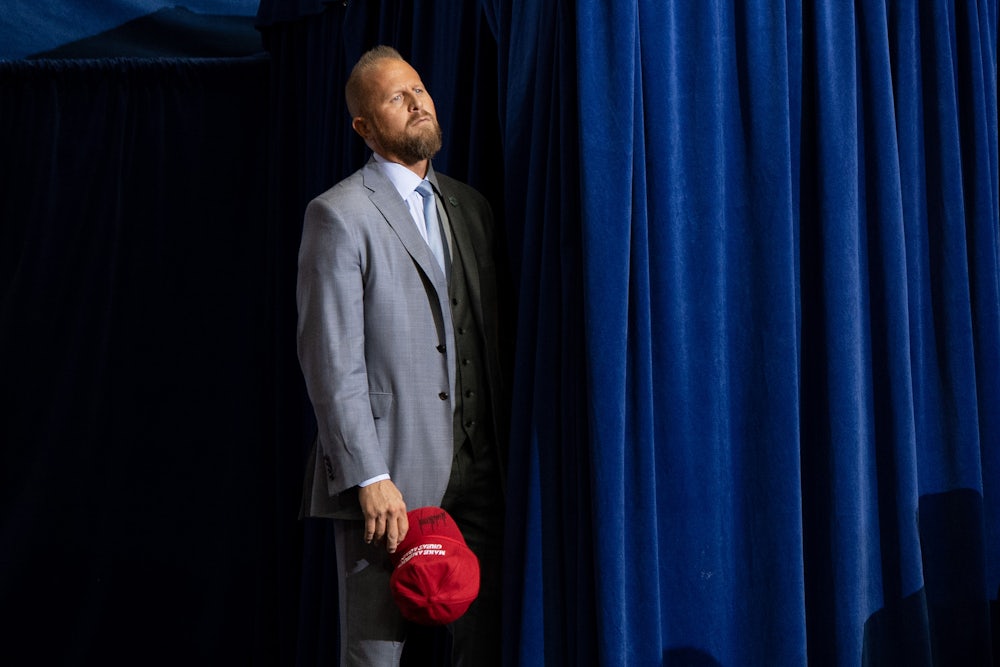Being the guy who resets a “Days/Hours/Minutes Without Donald Trump Firing Someone” sign could be a full-time job, though given the turnover that has plagued Trump’s campaigns and administration, it wouldn’t be a particularly secure one. The latest high-profile head to roll is a satisfying one to see: Brad Parscale, the Trump campaign manager who has been falsely hailed as some kind of digital genius. Important Trumpworld figures like Parscale often receive extensive and semi-awed coverage—think of how Steve “Darth Vader” Bannon was covered early in the Trump administration—as journalists baffled by how such a repulsive and dumb man could become president of the United States seek answers.
But even Wunderbrad could not steer the president smoothly through the impossible task of running a reelection campaign during a pandemic that has been made more catastrophic by Trump’s own mismanagement. The beginning of the end was reportedly the underwhelming attendance at the president’s much-hyped Tulsa rally, where he wowed the diminished crowd by drinking water. Now Bill Stepien—a Trump aide who was previously fired by Chris Christie during New Jersey’s “Bridgegate” scandal—will take on the impossible job of trying to lead a deluded president to victory, without any power to make Trump actually address any of his failings that have been greeted by voters with dismay. How long can any campaign manager walk the tightrope of staying in Trump’s good graces, stroking his fragile ego, assuring him that all the haters are wrong, and trying to make him appealing to an increasingly hostile public?
This Sisyphean task is made ever more difficult by Trump’s inability to focus. One of the most common and tiring warnings of the Trump era has been that whatever Trump is currently doing, saying, or tweeting is just a distraction from what actually matters. Half-baked schemes like his May executive order seemingly aimed at getting conservatives more likes on their posts are seen by many as cunning diversions from the Real Issues, which for the last few months have plainly been the coronavirus and the George Floyd protests.
As others have argued in the past, it doesn’t especially matter whether Trump is purposefully trying to distract us, because he is still doing these things as the president, which makes them important. But it’s also true that the amount of media coverage an individual action by the administration gets doesn’t seem to have much to do with whether Trump succeeds or fails; the media’s focus on Russia certainly didn’t amount to any kind of major defeat for Trump. I would be thrilled if most of the national politics reporters in Washington stopped writing about Trump and started writing about people who are waiting for unemployment checks, but it isn’t worth fretting that we’re playing his game. (There has also been a decent amount of coverage of Americans’ economic hardship, even if it’s not always amplified by cable news and social media.) Crucially, Trump doesn’t seem to know what game he’s playing, and his ideas about what coverage or messages benefit him are often completely wrong.
There is a funny sort of parallel here between worrying about Trump’s ability to distract us and the worries that Trump insiders are expressing about his flailing campaign. An anonymous White House source, quotes from whom comprise the most plentiful renewable resource on the planet, confessed to CNN that the campaign is struggling because Trump himself is distracted: “He’s not focused. Everyone has told him that. Nothing has changed.” Of course, this is something you hardly need inside knowledge to deduce. When has Trump ever been on message? Never mind tell-all books from relatives; anyone paying attention can deduce that Trump fixates on trivial matters, particularly those that have to do with whether he is powerful, masculine, or simply Winning. Hence his obsession with the idea that he can’t walk down stairs properly or that he can’t drink a glass of water.
This has always been his whole approach to campaigning and governing. When he railed against Gold Star families or John McCain, he didn’t do that with some masterful plan in mind to activate Republicans who are anti-McCain or anti-troops. He did it because they criticized him, and he doesn’t like that. It worked in 2016 because it turned out a critical mass of Republicans loved Trump, and they loved what he said about Mexicans and bringing the jobs back and how Hillary was a nasty crook.
It’s certainly not true or even knowable that this collapse in Trump’s popularity was inevitable even without the coronavirus. The entire election is rightly shaped by this rare event; Joe Biden could not have asked for much of a better demonstration of how dangerous Trump’s instability and incompetence is. But given that this is the awful timeline we live in, it probably was inevitable that Trump’s campaign would face such vicious—and, honestly, immensely funny—turmoil. For all the lauding of Brad Parscale as some sort of dark wizard of Facebook ads, there is no magic spell that can wave away 138,000 dead Americans, millions more infected, millions and millions further lives ruined. So congrats to Bill Stepien, but also some advice: Maybe don’t get too comfortable.
